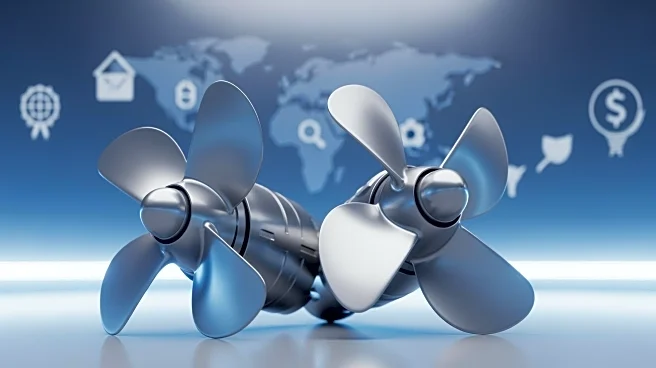What's Happening?
The Marine Propellers market is projected to grow significantly, with a forecasted increase from USD 5.79 billion in 2024 to nearly USD 7.72 billion by 2032. This growth is driven by advancements in fuel-efficient
propulsion systems and hybrid technology, which are transforming the industry. The resurgence of global trade routes and sustainable shipbuilding practices are providing new opportunities for shipbuilders, suppliers, and the naval sector. The market is seeing increased demand for lightweight, corrosion-resistant, and energy-efficient propellers, particularly in the Asia Pacific region, which is expected to hold the largest market share due to its robust shipbuilding industry.
Why It's Important?
The growth of the Marine Propellers market is significant for several reasons. It reflects the broader trends in global trade and the maritime industry, which are crucial for economic development. The adoption of advanced propulsion technologies is reducing carbon emissions and operational costs, aligning with international environmental standards. This shift benefits shipbuilders and operators by enhancing vessel performance and efficiency. Additionally, the market's expansion supports the modernization of naval fleets and the growth of marine tourism, contributing to economic activity in regions like Asia Pacific, Europe, and North America.
What's Next?
The Marine Propellers market is expected to continue evolving with technological innovations such as 3D manufacturing and AI-driven predictive maintenance. These advancements will optimize propeller performance and lifecycle, further driving market adoption. Environmental regulations will continue to challenge manufacturers, necessitating cleaner and more efficient compliance solutions. The recovery of shipbuilding sectors in key regions and increasing defense budgets will sustain demand for high-power propeller systems. As the market adapts to these changes, stakeholders will likely focus on strategic partnerships and investments in research and development.
Beyond the Headlines
The Marine Propellers market's growth has deeper implications for environmental sustainability and technological innovation. The industry's shift towards hybrid propulsion systems and low-carbon fuels is part of a broader effort to reduce the maritime sector's environmental impact. This transition may lead to long-term shifts in manufacturing practices and regulatory frameworks. Additionally, the integration of digital technologies in propeller design and maintenance could set new standards for efficiency and performance, influencing future developments in the maritime industry.











